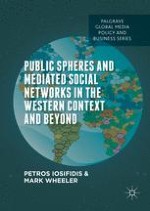2016 | OriginalPaper | Chapter
7. Public Diplomacy 2.0 and the Social Media
Authors : Petros Iosifidis, Mark Wheeler
Published in: Public Spheres and Mediated Social Networks in the Western Context and Beyond
Publisher: Palgrave Macmillan UK
Activate our intelligent search to find suitable subject content or patents.
Select sections of text to find matching patents with Artificial Intelligence. powered by
Select sections of text to find additional relevant content using AI-assisted search. powered by
